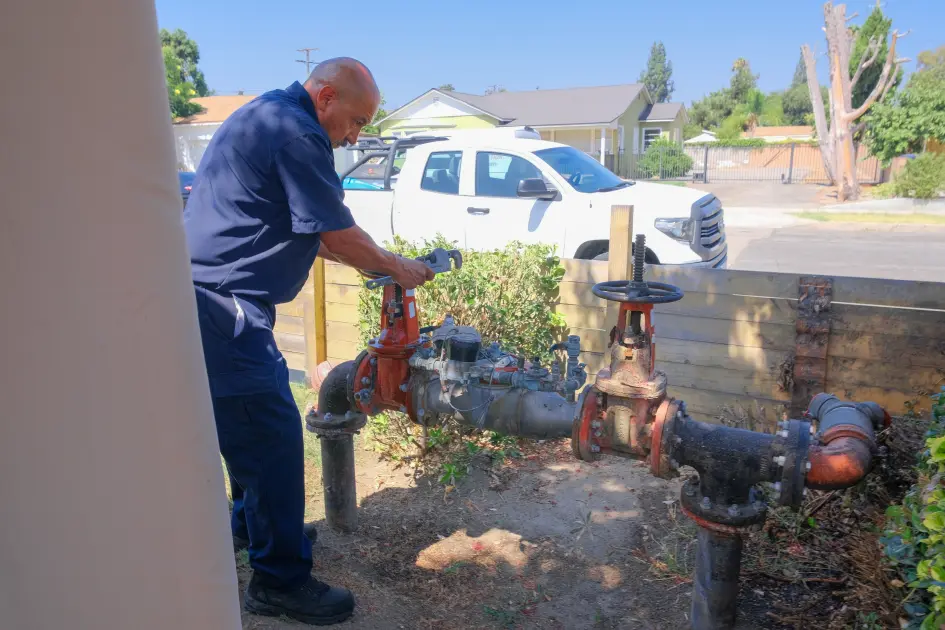Table of Contents
ToggleWhen it comes to maintaining a clean and safe water supply, one crucial yet often overlooked component is the backflow preventer. This small device plays a massive role in protecting drinking water from contamination. However, installing one is not enough—you also need regular backflow preventer testing to ensure it functions properly. In this post, we’ll explore what backflow is, why testing is essential, how the process works, and what homeowners and businesses should know about compliance and safety.
What is Backflow and Why Does It Matter?
Backflow occurs when water flows in the opposite direction of its intended path, potentially pulling contaminants into the clean water supply. This can happen due to sudden drops in water pressure, broken pipes, or even high demand from nearby hydrant use. Imagine pesticides from a lawn irrigation system or chemicals from an industrial site being siphoned into the drinking water supply—this is the type of health hazard backflow preventers are designed to stop.
A backflow preventer acts as a one-way gate that ensures water only flows in the right direction. Without it, the risk of contamination rises significantly, threatening both public health and compliance with local plumbing codes.
Why Backflow Preventer Testing is Necessary
Like any mechanical device, a backflow preventer can wear out, fail, or lose effectiveness over time. Springs may weaken, seals may break, or debris can clog the device. That’s why most municipalities and plumbing codes require annual backflow preventer testing by a certified professional.
Here are some key reasons why testing is so important:
- Protects Public Health – Contaminated water can cause serious illnesses and spread harmful bacteria, chemicals, or toxins. Testing ensures the device works as intended.
- Ensures Legal Compliance – Many cities require businesses, apartment complexes, and even some homes to submit backflow testing reports annually. Failing to comply can result in fines or service interruptions.
- Prevents Costly Repairs – Regular testing helps detect small issues before they turn into expensive repairs or replacements.
- Maintains Water Quality – Especially in areas with mixed water usage (irrigation, industrial, residential), testing guarantees safe, clean drinking water.
Who Needs Backflow Preventer Testing?
While residential homes with simple plumbing systems may not always require it, many properties are required by law to conduct backflow preventer testing. These include:
- Commercial buildings
- Restaurants and food service establishments
- Hospitals and healthcare facilities
- Apartment complexes
- Schools and universities
- Industrial facilities
- Homes with irrigation systems, pools, or fire sprinklers
Essentially, if your property connects to both clean and potentially contaminated water sources, you need a backflow preventer—and it must be tested regularly.
How Backflow Preventer Testing Works
The process of testing is straightforward but must be carried out by a certified backflow tester or licensed plumber. Here’s what typically happens during an inspection:
- Shut-Off – The water supply to the backflow device is turned off.
- Device Inspection – The plumber checks for visible signs of wear, damage, or leaks.
- Testing Equipment – Special gauges are connected to the device to measure water pressure and flow direction.
- Performance Check – The tester verifies that the backflow preventer closes properly and that no water leaks backward into the system.
- Repairs if Needed – If the device fails, immediate repairs or replacements may be recommended.
- Report Submission – A certified test report is submitted to the local water authority or municipality for compliance.
Most inspections take less than an hour, but they play a huge role in safeguarding community water quality.
Signs You May Need Backflow Preventer Repair or Replacement
Even with regular testing, backflow preventers can fail unexpectedly. Some warning signs include:
- Unusual taste or odor in your water
- Visible sediment or discoloration in tap water
- Frequent leaks around the preventer valve
- Drop in water pressure
- Moisture buildup around the plumbing system
If you notice any of these, call a licensed professional for testing immediately.
Compliance and Legal Requirements
Most states and municipalities enforce strict backflow prevention codes. For example, some require annual backflow preventer testing with certified documentation submitted to the water authority. Businesses that fail to comply may face:
- Fines or penalties
- Suspension of water service
- Liability in case of contamination incidents
By staying proactive and scheduling timely inspections, you not only stay compliant but also demonstrate a commitment to public health and safety.
Choosing the Right Professional for Backflow Preventer Testing
Since testing requires specific tools and certification, it’s important to choose a qualified professional. When hiring a plumber or tester, look for:
- Certification & Licensing – Ensure they are approved by your local water authority.
- Experience – Backflow devices can vary, so experience matters.
- Reputation – Check reviews and references.
- Reporting Capabilities – A certified tester should file compliance reports directly with the municipality.
Benefits of Routine Backflow Preventer Testing
- Peace of Mind – You know your water supply is safe and protected.
- Community Health – Prevents widespread contamination incidents.
- Property Protection – Reduces plumbing issues and costly water damage.
- Sustainability – Ensures long-term reliability of local water systems.
Final Thoughts
Clean water is something many of us take for granted, but it requires careful safeguards to maintain. Backflow preventer testing is one of those safeguards that ensures your water remains safe, your property stays compliant, and your community is protected from potential contamination.
Whether you’re a business owner, property manager, or homeowner, scheduling regular backflow preventer testing is not just a legal responsibility—it’s a moral obligation to protect public health. Don’t wait until a contamination incident happens. Stay proactive, stay compliant, and keep your water safe with professional backflow testing services.




